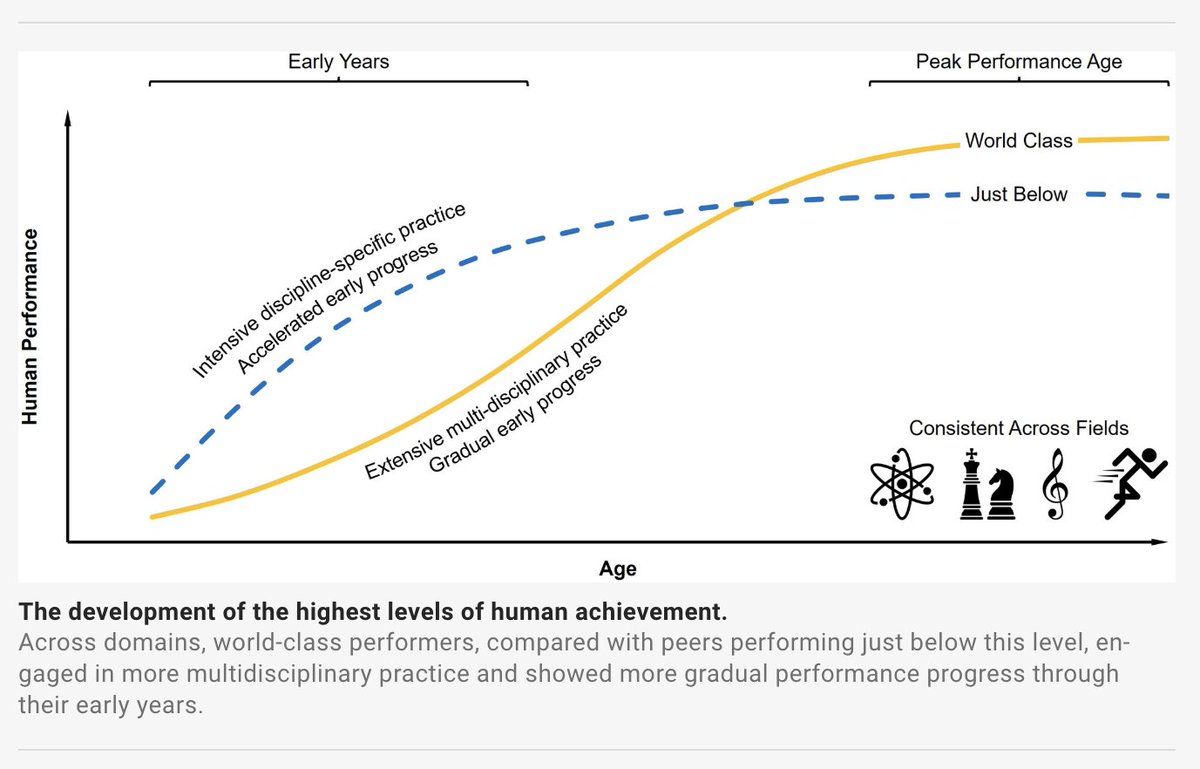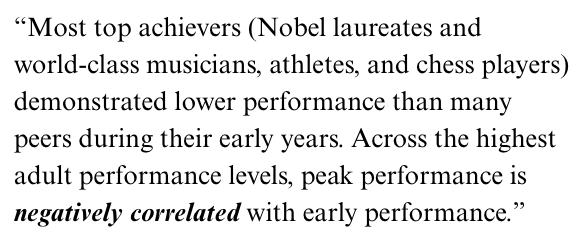Been thinking a lot about peak performance, genuine excellence, and what really matters for it.
Here are 19 habits and principles, all based on years of research, writing, and coaching:
Here are 19 habits and principles, all based on years of research, writing, and coaching:
1. Focus on Process over Outcomes
Once you pick a goal, outline the steps to attain it, and then do what you can to largely forget about the goal and focus on nailing those steps instead.
Less energy worrying about future success of failure, more energy for doing the work.
Once you pick a goal, outline the steps to attain it, and then do what you can to largely forget about the goal and focus on nailing those steps instead.
Less energy worrying about future success of failure, more energy for doing the work.
2. Build Deep Community
Motivation is contagious. We are all mirrors reflecting onto one another. The people around you provide gravity when you soar and they provide a safety net when you fall. Nobody reaches the top alone.
Motivation is contagious. We are all mirrors reflecting onto one another. The people around you provide gravity when you soar and they provide a safety net when you fall. Nobody reaches the top alone.
3. Balance Stress and Rest
Too much of the former not enough of the latter the result is illness, injury, burnout. Too much of the latter not enough of the former the result is complacency and stagnation.
Stress + Rest = Growth.
Too much of the former not enough of the latter the result is illness, injury, burnout. Too much of the latter not enough of the former the result is complacency and stagnation.
Stress + Rest = Growth.
4. Prioritize Consistency over Intensity
If you go big or go home you often end up home. But small steps taken regularly over time lead to big gains. Resist the urge to exert the heroic efforts that will leave you completely exhausted later on. Think steady progress instead.
If you go big or go home you often end up home. But small steps taken regularly over time lead to big gains. Resist the urge to exert the heroic efforts that will leave you completely exhausted later on. Think steady progress instead.
5. Learn to Have Fun While Working Hard
If you aren’t having fun along the way then you probably won’t last very long.
Not every day has to be enjoyable, the totality of the process ought to be meaningful and fulfilling, and the more you can smile the better.
If you aren’t having fun along the way then you probably won’t last very long.
Not every day has to be enjoyable, the totality of the process ought to be meaningful and fulfilling, and the more you can smile the better.
6. Understand Progress is Non-Linear
People think progress is a line that goes straight up and to the right. But the truth is it’s a zig-zag. Don’t worry about up and to the right over any given week, month, or maybe even year. Worry about up and to the right over a lifetime.
People think progress is a line that goes straight up and to the right. But the truth is it’s a zig-zag. Don’t worry about up and to the right over any given week, month, or maybe even year. Worry about up and to the right over a lifetime.

7. Take the Work Seriously, but Have a Sense of Identity Beyond It
This way, if things are going poorly in one area of your life you can lean into another. You can be a craftsperson and an athlete and a parent and a partner and a neighbor and a dog enthusiast and so on.
This way, if things are going poorly in one area of your life you can lean into another. You can be a craftsperson and an athlete and a parent and a partner and a neighbor and a dog enthusiast and so on.
8. Feeling Good and Doing Good are Generally in Alignment
Your mind-body system has a wonderful feedback mechanism: how you feel. When you feel off that usually means something is wrong. When you feel on it means things are right. Pay attention to this over time.
Your mind-body system has a wonderful feedback mechanism: how you feel. When you feel off that usually means something is wrong. When you feel on it means things are right. Pay attention to this over time.
9. Don’t Worry About Being the Best; Be the Best at Getting Better.
All you can control is your effort. Yes, learn from others, but do not become too concerned with how they are doing. Focus on making continual improvement and let the chips fall where they may.
All you can control is your effort. Yes, learn from others, but do not become too concerned with how they are doing. Focus on making continual improvement and let the chips fall where they may.
10. Do the Work before Talking About the Work
Talking is easy. Action is hard. Be careful of a common trap, which is the fact that you are talking about the work replaces doing it.
My own rule: I write my books before talking about them.
Talking is easy. Action is hard. Be careful of a common trap, which is the fact that you are talking about the work replaces doing it.
My own rule: I write my books before talking about them.
11. Lean on Routines but be Okay Releasing From Them
Routines automate action and lend predictability to an otherwise chaotic world. However, be sure you can release from routines when you need to. If your favorite cafe for working shuts down you still better be able to work.
Routines automate action and lend predictability to an otherwise chaotic world. However, be sure you can release from routines when you need to. If your favorite cafe for working shuts down you still better be able to work.
12. Develop a Physical Practice
We are not minds and bodies. We are mind-body systems. Try to make physical activity a part of your job, whatever your job may be.
Need not be heroic. A brisk walk does wonders for focus, creativity, problem solving, emotional control, and so on.
We are not minds and bodies. We are mind-body systems. Try to make physical activity a part of your job, whatever your job may be.
Need not be heroic. A brisk walk does wonders for focus, creativity, problem solving, emotional control, and so on.
13. Cultivate Emotional Flexibility
This is about holding everything at once—happiness, joy, and enthusiasm at the same time as anger, sadness, and frustration—and being able to feel differently at various points throughout the same day and perhaps even the same hour.
This is about holding everything at once—happiness, joy, and enthusiasm at the same time as anger, sadness, and frustration—and being able to feel differently at various points throughout the same day and perhaps even the same hour.
14. Care Deeply
Not giving your all on something about which you care deeply can be a way of copping out. It gives you an excuse if things don’t go how you want them to. Giving your all, leaving every bit out there, exposes you. It makes you vulnerable. But that’s the point.
Not giving your all on something about which you care deeply can be a way of copping out. It gives you an excuse if things don’t go how you want them to. Giving your all, leaving every bit out there, exposes you. It makes you vulnerable. But that’s the point.
15. Accept Failure as a Part of Growth
It is easier to give your all if you are okay with failing. If you are not okay with failing, you’ll protect yourself. If you are okay with failing, your ego is safe regardless of the outcome, so you’ll be more likely to lay it on the line.
It is easier to give your all if you are okay with failing. If you are not okay with failing, you’ll protect yourself. If you are okay with failing, your ego is safe regardless of the outcome, so you’ll be more likely to lay it on the line.
16. Show Up—Even, Perhaps Especially—When You Don’t Want To
The best performers have high ceilings, no doubt, but they are even better at raising their floors, which comes down to being able to put together a decent day when you don’t really want to.
The best performers have high ceilings, no doubt, but they are even better at raising their floors, which comes down to being able to put together a decent day when you don’t really want to.
17. Learn When to Grit and When to Quit
Pay close attention to when you grit and when you quit, and what you get out of each. Over time, you’ll get more refined at learning which approach makes the most sense under different circumstances.
Pay close attention to when you grit and when you quit, and what you get out of each. Over time, you’ll get more refined at learning which approach makes the most sense under different circumstances.
18. Don’t Forget to Experience Joy
When you attain goals along your path or notch some big wins, take the time to enjoy and celebrate them! These moments are what give you the fortitude and resilience to keep going when the going gets tough.
When you attain goals along your path or notch some big wins, take the time to enjoy and celebrate them! These moments are what give you the fortitude and resilience to keep going when the going gets tough.
19. Practice your Values
Your values represent your guiding principles. They serve as your internal dashboard. Regardless of what is happening around you, you can always choose to act in alignment with your values—and look yourself in the mirror and fall asleep well at night.
Your values represent your guiding principles. They serve as your internal dashboard. Regardless of what is happening around you, you can always choose to act in alignment with your values—and look yourself in the mirror and fall asleep well at night.
If you want more ideas and insights like the above:
1) Follow along here @BStulberg, where I strive to be an evidence-based signal amidst all the noise.
2) Read my latest book, a guide to genuine excellence that I poured mind, heart, and soul into: amzn.to/3zDNkYj
1) Follow along here @BStulberg, where I strive to be an evidence-based signal amidst all the noise.
2) Read my latest book, a guide to genuine excellence that I poured mind, heart, and soul into: amzn.to/3zDNkYj

Also: check out any and all of these—old and new—that also explore striving, progress, excellence including works by @angeladuckw @RebeccaSolnit @RyanHoliday @stevemagness @DavidEpstein @nntaleb @TaraBrach @anniemurphypaul @mkonnikova @richroll @sbkaufman @the_innergame and more. 

P.s., Amazon does random price drops and The Practice of Groundedness—which digs deep into all the above habits, principles, and more—is currently 37% (10$) off!
If found the thread valuable and want to learn more this is probably the best deal you’ll get:amazon.com/Practice-Groun…
If found the thread valuable and want to learn more this is probably the best deal you’ll get:amazon.com/Practice-Groun…
Some of you have asked for this thread in a single document. I went ahead and put that together over @Medium, with a few of the principles and habits slightly more built out. Here you go: bstulberg.medium.com/the-habits-of-…
• • •
Missing some Tweet in this thread? You can try to
force a refresh








